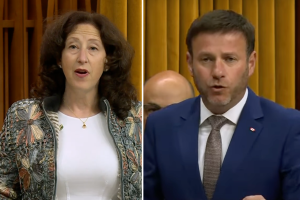The provincial election race in York Centre is shaping up to be an interesting one, as voters and candidates wait to see whether independent MPP Roman Baber decides to run again.
Baber was a freshman MPP when he was elected in 2018, as part of a blue tide that swept the Conservatives into a majority government. But he was turfed out of the Tory caucus one year ago when he opposed Premier Doug Ford’s policy on COVID lockdowns.
Ford made it clear that if Baber were to run again, it would not be for the Conservatives
The 41-year-old lawyer told The CJN that he will decide “within a month or so” whether to run for re-election, depending on “personal and political considerations.”
In the past year, Baber has not changed his stance that lockdowns have been the cause of more misery and death than the COVID virus itself. Earlier this month, he held a press conference on the one-year anniversary of his ejection from caucus, reiterating that the toll of school closures, delayed surgeries and escalating overdose deaths outweigh the benefit of lockdowns. Although he is vaccinated, he defends those who refuse to get the shots.
Doug announced a partial re- opening 11 days in advance because he is bleeding in the polls. It was never about science – politics caught up with @fordnation. Thousands of people died from lockdowns and millions of lives ruined. We need to #FireFordOpenOntario! #onpoli #cdnpoli pic.twitter.com/i81sGtNmCB
— Roman Baber (@Roman_Baber) January 20, 2022
Meanwhile, the experience of being an independent MPP has been a positive one, he said.
“It’s been a gratifying experience to speak to issues that matter to Ontarians, and be able to articulate an opinion that I would be precluded from articulating if I was a member of a government or one of the recognized parties,” he said. “That means an ability to speak for millions of Ontarians who don’t have a voice.”
Probably no one is watching Baber’s decision more closely than Shelley Brown, the Liberal candidate, and Michael Kerzner, running for the Conservative party. Both have already started campaigning. (The NDP has yet to select a candidate for the June 2 election.)
Shelley Brown is a retired human rights lawyer and a community advocate. We’re happy to announce that Shelley is officially your @OntLiberal 2022 candidate for York Centre: https://t.co/dQYkiBhhJJ! #onpoli pic.twitter.com/ULb6AiYCzh
— Ontario Liberal Party | Parti Libéral de l'Ontario (@OntLiberal) December 17, 2021
Brown, 69, recently retired from a career as a lawyer focusing on employment and human rights law. He’s volunteered on several Liberal campaigns, both provincially and federally and said he felt now was the right time to throw his hat in the political ring.
“Partly, because I’m a grandfather and I see that there’s a need for good representation to be concerned about what’s happening in the future. And partly because of the pandemic and I think what has been done in response to the pandemic has been problematic, to say the least.”
Pointing to the government’s last-minute decision to push back school openings by two weeks from Jan. 5 to Jan. 17, he blames Ford for an inconsistent approach to handling COVID.
“He’s still not in a situation where the rules and the regulations and restrictions are well known. He’s still making things up as he goes along,” Brown said. “If this continues, I really have some doubt as to whether or not on June 2 we’re really going to be ahead of the game.”
The pandemic revealed the social inequities in the riding. Residents working in the service sector or as health care aides, were marginalized and not dealt with appropriately, he said. “We need to be in a position where these people who have kept us going don’t have to worry about sacrificing their health in order to maintain their income.”
Among his priorities if he was elected, would be to improve paid sick leave and remove the cap on nurses’ salaries.
Michael Kerzner, a 58-year-old entrepreneur, said he hadn’t initially considered running in any election. “But I really felt that there’s a time in everybody’s life when they can make a difference. And when the (Conservative) party had suggested that I considered being the candidate, it’s a humbling experience.”
We know our values. We know our vision. And we have the All-Star volunteer team to get it done!
— Michael Kerzner (@MPPKerzner) December 5, 2021
Thanks to the #KerznerKrew! We’re painting #YorkCentre blue! pic.twitter.com/fA4DM4yEyZ
Kerzner, who is the founder of a biosciences firm, says he was “agnostic” about politics, although he always leaned toward the Conservative party. In 2015, former York Centre MP Mark Adler asked him to become the president of the riding’s Conservative association.
“I thought that the (Liberal) Wynne-McGuinty-Del Duca government was just taking Ontario in the wrong direction, burdening us with unbearable debt,” he said. “I thought Premier Ford had an opportunity in 2018 to change the paradigm of government and the level of transparency and I think he’s done a great job.”
Although he has little political experience, Kerzner points to his deep roots in the riding, especially the Jewish community, which include serving as the president of Beth Emeth Synagogue and sitting on the boards of Camp Ramah and Ve’ahavta.
Kerzner said he had knocked on about 1,000 doors in the riding, before the last COVID outbreak. Among the concerns he heard, were about the health care system, which he says has been underfunded by previous governments and whether schools were going to be safe to re-open.
A coalition of private schools, including a Toronto yeshiva, have sued the provincial government for not distributing what they argue is their share of federal funds earmarked for COVID-related supplies. A decision in the case is pending.
The issue is “complicated”, Kerzner said, however, “the faith-based schools have to have access to PPE and they have to access to the rapid tests.”
Education minister Stephen Lecce has intervened at least twice in the last few weeks to ensure that Jewish day schools in the riding received N95 masks and rapid tests, Kerzner said.
Liberal Monte Kwinter represented York Centre for more two decades, until he retired in 2018. The riding has one of the largest concentrations of Jews, close to 20 per cent, along with sizeable Filipino and Russian communities.
Baber was born in the Soviet Union and raised in Israel before he came to Canada as a teenager with his family, settling in the riding where he attended William Lyon Mackenzie Collegiate Institute. He later attended York University and then studied law at Western University. He describes himself as “exhibit A for Canadian opportunity.”
“That’s why I got into politics, to preserve Canadian opportunity… and I’m very sad that it looks as if Canadian opportunity is eroding,” he said.







